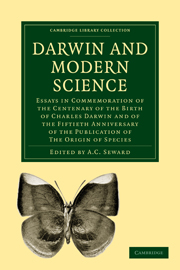 Darwin and Modern Science
Darwin and Modern Science Book contents
- Frontmatter
- PREFACE
- Contents
- LIST OF ILLUSTRATIONS
- DATES OF THE PUBLICATION OF CHARLES DARWIN'S BOOKS AND OF THE PRINCIPAL EVENTS IN HIS LIFE
- I Introductory Letter to the Editor from SIR
- II Darwin's Predecessors
- III The Selection Theory
- IV Variation
- V Heredity and Variation in Modern Lights
- VI The Minute Structure of Cells in Relation to Heredity
- VII “The Descent of Man”
- VIII Charles Darwin as an Anthropologist
- IX Some Primitive Theories of the Origin of Man
- X The Influence of Darwin on the Study of Animal Embryology
- XI The Palaeontological Record. I. Animals
- XII The Palaeontological Record. II. Plants
- XIII The Influence of Environment on the Forms of Plants
- XIV Experimental Study of the Influence of Environment on Animals
- XV The Value of Colour in the Struggle for Life
- XVI Geographical Distribution of Plants
- XVII Geographical Distribution of Animals
- XVIII Darwin and Geology
- XIX Darwin's work on the Movements of Plants
- XX The Biology of Flowers
- XXI Mental Factors in Evolution
- XXII The Influence of the Conception of Evolution on Modern Philosophy
- XXIII Darwinism and Sociology
- XXIV The Influence of Darwin upon Religious Thought
- XXV The Influence of Darwinism on the Study of Religions
- XXVI Evolution and the Science of Language
- XXVII Darwinism and History
- XXVIII The Genesis of Double Stars
- XXIX The Evolution of Matter
- INDEX
IX - Some Primitive Theories of the Origin of Man
Published online by Cambridge University Press: 07 September 2010
- Frontmatter
- PREFACE
- Contents
- LIST OF ILLUSTRATIONS
- DATES OF THE PUBLICATION OF CHARLES DARWIN'S BOOKS AND OF THE PRINCIPAL EVENTS IN HIS LIFE
- I Introductory Letter to the Editor from SIR
- II Darwin's Predecessors
- III The Selection Theory
- IV Variation
- V Heredity and Variation in Modern Lights
- VI The Minute Structure of Cells in Relation to Heredity
- VII “The Descent of Man”
- VIII Charles Darwin as an Anthropologist
- IX Some Primitive Theories of the Origin of Man
- X The Influence of Darwin on the Study of Animal Embryology
- XI The Palaeontological Record. I. Animals
- XII The Palaeontological Record. II. Plants
- XIII The Influence of Environment on the Forms of Plants
- XIV Experimental Study of the Influence of Environment on Animals
- XV The Value of Colour in the Struggle for Life
- XVI Geographical Distribution of Plants
- XVII Geographical Distribution of Animals
- XVIII Darwin and Geology
- XIX Darwin's work on the Movements of Plants
- XX The Biology of Flowers
- XXI Mental Factors in Evolution
- XXII The Influence of the Conception of Evolution on Modern Philosophy
- XXIII Darwinism and Sociology
- XXIV The Influence of Darwin upon Religious Thought
- XXV The Influence of Darwinism on the Study of Religions
- XXVI Evolution and the Science of Language
- XXVII Darwinism and History
- XXVIII The Genesis of Double Stars
- XXIX The Evolution of Matter
- INDEX
Summary
On a bright day in late autumn a good many years ago I had ascended the hill of Panopeus in Phocis to examine the ancient Greek fortifications which crest its brow. It was the first of November, but the weather was very hot; and when my work among the ruins was done, I was glad to rest under the shade of a clump of fine holly-oaks, to inhale the sweet refreshing perfume of the wild thyme which scented all the air, and to enjoy the distant prospects, rich in natural beauty, rich too in memories of the legendary and historic past. To the south the finely-cut peak of Helicon peered over the low intervening hills. In the west loomed the mighty mass of Parnassus, its middle slopes darkened by pine-woods like shadows of clouds brooding on the mountain-side; while at its skirts nestled the ivymantled walls of Daulis overhanging the deep glen, whose romantic beauty accords so well with the loves and sorrows of Procne and Philomela, which Greek tradition associated with the spot. Northwards, across the broad plain to which the hill of Panopeus descends, steep and bare, the eye rested on the gap in the hills through which the Cephissus winds his tortuous way to flow under grey willows, at the foot of barren stony hills, till his turbid waters lose themselves, no longer in the vast reedy swamps of the now vanished Copaic Lake, but in the darkness of a cavern in the limestone rock.
- Type
- Chapter
- Information
- Darwin and Modern ScienceEssays in Commemoration of the Centenary of the Birth of Charles Darwin and of the Fiftieth Anniversary of the Publication of The Origin of Species, pp. 152 - 170Publisher: Cambridge University PressPrint publication year: 2009First published in: 1909


